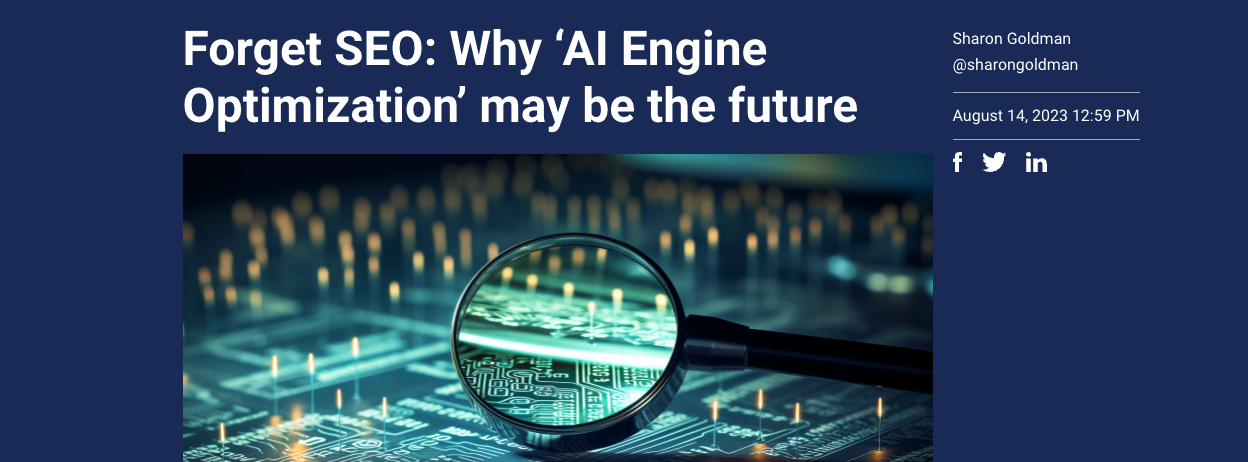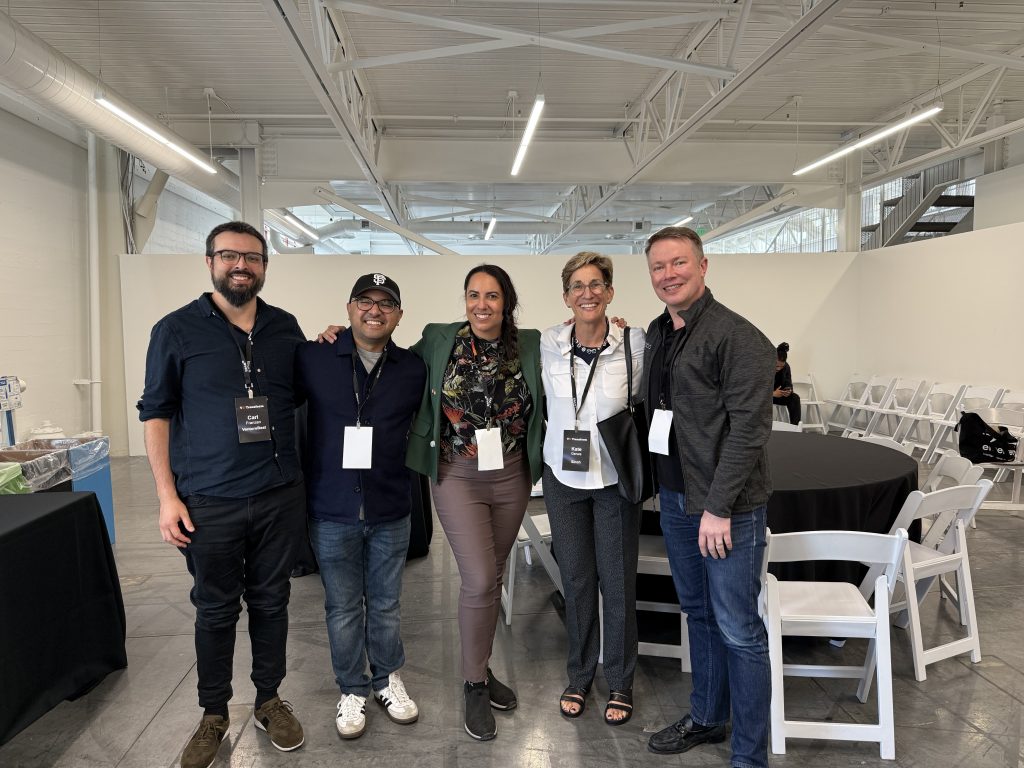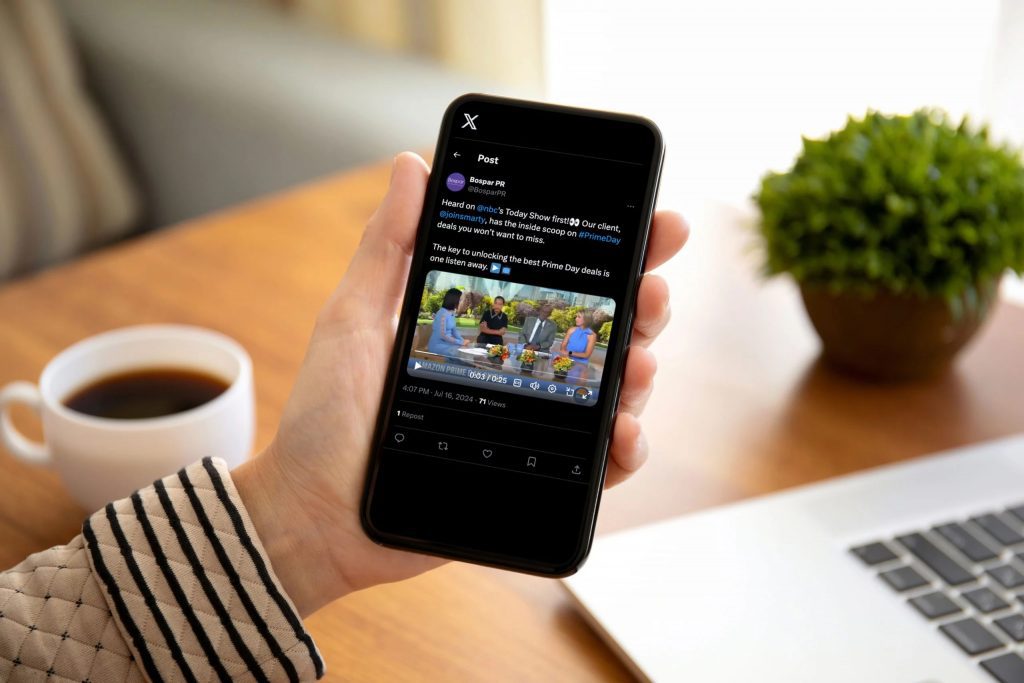Bospar is diligent in its efforts to stay on top of emerging and evolving trends in business, journalism and tech. We work hard in our PR efforts to get the word out to media about what our clients do and how they add value. But it’s not a one-way conversation. We also connect regularly with reporters and editors to understand how they think and feel about topics like AI.
The recent Bospar Press Play webinar “How AI in Search is Changing Journalism” featured VentureBeat senior writer Sharon Goldman and MarketWatch senior reporter Jon Swartz chatting with Bospar’s Eric Chemi, a former CNBC and Bloomberg reporter, about Google’s new AI news summary feature, Bospar research on search queries, SEO efforts and a whole lot more.

Last week’s blog focused on Jon’s comments. This week we’ll explore what Sharon had to say.
When you hear the term AI search results as it relates to journalism, what comes to mind?
Sharon: I think the first thing that comes to mind is how crazy it is, since I’m covering AI, and so tackling the issue of AI in search as it relates to journalism – it’s all very meta.
But the main word that comes to mind is uncertainty. That’s true to journalists, and I think that’s true for marketers. No one really knows how it’s going to play out.
There are lots of opinions and lots of people who are exploring these issues. And, certainly, every journalism organization has to be considering and planning for it. But the uncertainty is so great that there’s only so much you can do to prepare right now.
Your story “Forget SEO: Why ‘AI Engine Optimization’ May Be the Future” quoted founder, investor and industry analyst Jeremiah Owyang saying “The advertising model as we know it – getting people to go to your website and view it – that’s going to break. I don’t see how it sustains.” Who are the winners and losers? Are they the same if the current model breaks?
Sharon: It depends on who your audience is. Let’s take The New York Times, for example, which is a subscription model. They’re certainly impacted by SEO, but they’re also very focused on their subscribers and building a subscriber base. So, they don’t want their content to be scraped by AI, for example. They want to make sure that they still have control over their content.
So, in a way, they may not be impacted as much by changes in SEO as a publication that is solely using SEO to drive traffic. That’s where you might see some real losers if there isn’t some buildup to understanding how publishers can take advantage of AI agents that will be getting a lot of that search traffic. If Google, for example, in its snippets at the top – we’re just talking the near-term way Google Bard is right now, for example – if it shows you an AI-generated snippet at the top, how can you impact potentially being that snippet or part of that snippet for people to know that that information came from you? In that case, you might want to have Google training on your content so you might show up more readily in those search results.
But, on the other hand, if you are a subscriber model, you want to have control over your content and you don’t want to be trained. So, I think it depends on your audience.
As far as winners and losers, that it remains to be seen because this is a really long play. Changes are coming. Just within the past few days there’s been a lot of talk about these more autonomous AI agents. But it’s not going to happen overnight, it’s going to take a long time.
We can see just from the Google case Google has the most power in search; therefore, they’re gathering the most data to build the strongest large language models that power generative AI.
Do you worry about what AI search results will do to your job as a journalist? Journalists have a different incentive than the news organizations that they work for. Companies care about the bottom line, while journalists are trying to get their stories out to the people of the world.
Sharon: The New York Times recently changed their terms of service to say that you can’t train on The New York Times content. That’s a site that has a paywall and is working towards making sure that it doesn’t make the same mistakes that it has in the past. The original AI models were trained on The New York Times content. But going forward, they won’t be, presumably.
I recently spoke to an attorney who said that one of the biggest lawsuits of our time isn’t even a lawsuit yet. That will be The New York Times against big tech like OpenAI for training on their content. The New York Times is taking this very seriously. I don’t think it’s an issue of paywall vs. not paywall. Every media organization is going to have to figure out how this works for them. Disney’s Bob Iger is totally up in arms about generative AI from a media standpoint.
From my personal standpoint, as someone who covers AI, I obviously am using a lot of these tools. I certainly experiment with them. I need to be doing that. We all need to be doing that.
VentureBeat is an SEO-driven organization. So, of course, I’m concerned what happens if my traffic slows down or we can’t share our stories in the same way. That said, I wouldn’t rule out journalism just yet. I also worked at magazines back in the day, and those totally went by the wayside. There aren’t really print magazines anymore, that whole model of advertising in print has ceased to exist. It remains to be seen how this plays out. Again, we’re not talking overnight.
Google search as it stands today is not going anywhere. The change is that if more and more consumers start using these AI tools in place of search, then that could change the balance over time. Over the near term, there could be some behavior changes. But, on the other hand, I don’t think it’s a slam dunk that consumers are going to change their behaviors.
Will AI being used to aggregate and summarize news eliminate the kind of strategies media outlets sometimes use – like doing 10 articles on an eclipse – to get the best from SEO efforts?
Sharon: I think the point in my article that Jeremiah Owyang was trying to make is that we need to be thinking about these things and preparing because change is coming. SEO is not going to be the same. For a journalism organization does that mean going to a subscriber model? Does it mean going to some other kind of platform model? Jeremiah was saying in the piece that the idea of AI engine optimization is about how to influence the AI. SEO is kind of influencing the search engine. But what happens when you need to influence the AI influencers?
TikTok is probably the main source of news for Gen Z at this point. So, media has already had to take steps to reimagine it’s news coverage and how to connect people to their journalism.
I do think that will continue. I don’t consider that to be a death knell for journalism, and I don’t consider AI-generated articles to be the death knell of journalism either.
But every organization, if they’ve been slow in the past to keep abreast and at pace with what the technology is doing, this is the time to start. I do think every media organization needs an AI policy. And every advertising and marketing department at media organizations needs to consider what’s going to happen to SEO. I don’t think we have any answers as of yet.
Bospar recently did research relating to Google’s AI-powered news summarization feature. More than three-fourths (76%) claimed that they’re going to read all the articles, but we know that they’re not. The survey group indicated they like the convenience: 64% said it’s appealing because they never read the full article, while 69% said they want all news summarized in one location. Meanwhile, 56% said they are worried that the use of AI in search will undermine journalism, and 53% think Google currently has too much control over the news – so, the number of people who voiced concerns is lower than those who like the convenience. You wonder if that delta is what will force things to move in that direction.
Sharon: I think convenience will definitely win out. But I don’t think you can really predict consumer behavior around AI at this point. For example, there are many studies right now that show that the vast majority of people have not tried tools like ChatGPT before, so they don’t know what it’s like. Maybe they haven’t observed what’s going on in Google Bard or Microsoft Bing. There’s a real tendency in the world of AI to hype it up and assume that everyone is already using the tools, everyone has new behaviors in place. It really remains to be seen.
That said, history shows that convenience is king, so if consumers are presented with an easy way to get access to what they want, they’ll probably take them up on it.
Are there certain industries that do or do not have a good vision of AI and how to use it?
Sharon: Many top companies have a really good sense of what their vision is. I’m talking about non tech companies. I just spoke to the CIO of Goldman Sachs last week. They’ve been using AI for years in many different use cases. They had early access to ChatGPT and a lot of these tools. I think that they have a strong vision of what they want to do with AI and how it can happen.
The trick for companies like that, for Fortune 500 companies, is it needs to be secure, it needs to be trustworthy, it needs to be in a way that works for an enterprise company. That’s not the same as you and I logging onto ChatGPT and prompting it.
Even though it’s not here yet for the them, I can guarantee you that these companies are working on it – and it’s definitely coming if not there yet. Generative AI, the word didn’t even exist a year ago. But AI has been around for a very long time… Predictive AI has been used in tools that you use every day for over a decade, and I’ve been reporting on it since then.
So, it’s definitely nothing new.
[We haven’t heard more about AI until now because] it wasn’t advanced enough and in an interface that consumers could use it. The reason that it’s been in the news in the past year is because the day ChatGPT came out was the day that you could ‘talk’ to an AI.
That had never happened before. That had never been developed before.
But enterprises have been using – and big tech has been using – predictive AI for 10 years.
It’s in Google Maps. It’s in Google Photos. It’s in your Alexa. It’s in Siri. It’s in your car.
It’s in so many things we use every day.




